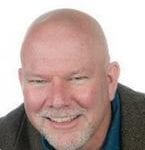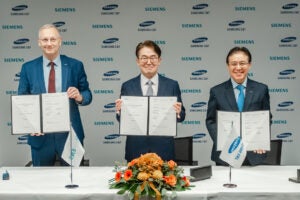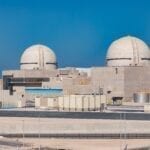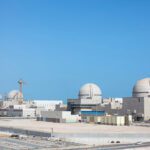The United Arab Emirates (UAE) is set to begin commercial operation of the Middle East’s first nuclear power plant, after the country’s regulatory agency on Feb. 17 gave its approval for the start-up of the first reactor at the Barakah site. The plant can now begin loading fuel, and Unit 1 is expected to come online by year-end.
Finished Plant Will Include Four Reactors
The Barakah nuclear plant, located about 150 miles east of the capital Abu Dhabi on a strip of desert along the Persian Gulf, is a 5,600-MW generation capacity development featuring four APR-1400 reactors. It is being built and run by a venture led by Korea Electric Power Corp. (KEPCO). Construction of the plant, with an original budget of $20 billion, began in 2012. Barakah originally was scheduled to begin fuel loading in August 2017, but construction delays, including “adverse findings” from the country’s Federal Authority for Nuclear Regulation (FANR), have pushed back the start date, despite the first reactor being completed in 2018. Analysts estimate the finished cost of the plant will be between $25 billion and $30 billion.
“Barakah was meant to be the showcase for the international nuclear industry,” Mycle Schneider, an independent analyst, told Bloomberg. “Grid connection is at least three years late, and there is no doubt that it is way over budget.”
The UAE hopes to have all four reactors at the site operating by 2023. The nuclear plant once fully commissioned will represent about 20% of the nation’s installed generating capacity.
Region Poised for Nuclear Development
Other nations in the Middle East, including Egypt and Saudi Arabia, are looking at nuclear power. Iraq had a research reactor that was destroyed by an Israeli air strike in 1981. Iran, not considered an Arab state, has operated the Bushehr nuclear plant since 2011—36 years after construction began at the site, with years of delay caused by the 1979 Islamic revolution, and repeated bombings of the site during the eight-year Iran-Iraq war that began in 1980. A second unit at Bushehr is now under construction as part of a partnership with Russia.
The UAE wants to diversify its energy industry. The country, the third-largest producer in the Organization of Petroleum Exporting Countries (OPEC), has long depended on its domestic production of oil and natural gas, with gas powering nearly all of the country’s electricity generation. Dubai, the business center of the UAE, located about 90 miles northwest of Abu Dhabi on the Persian Gulf, has established a target of receiving 75% of its power supply from solar energy and other renewables by 2050.
Nawah Energy Co., the Abu Dhabi-based joint venture between KEPCO and the state-run Emirates Nuclear Energy Corp. (ENEC) that will operate the Barakah reactors, “can fulfill all the safety requirements of the UAE,” said Christer Viktorsson, head of the FANR, at a news conference Monday in Abu Dhabi. Nawah officials said a government-sponsored training program has produced 380 Emirati nuclear experts. The company said about 60% of the staff members at ENEC are citizens of the UAE.
—Darrell Proctor is a POWER associate editor (@DarrellProctor1, @POWERmagazine).









